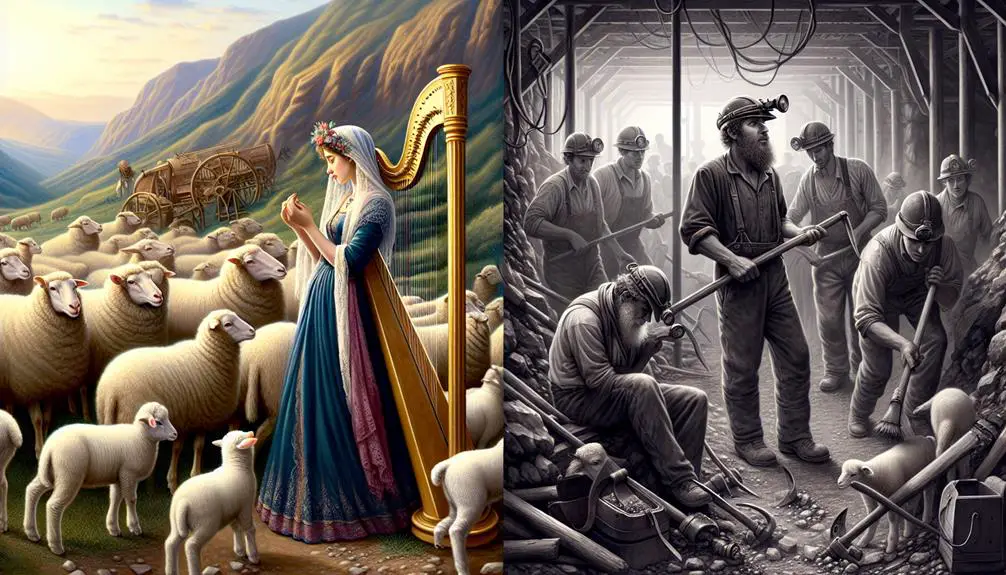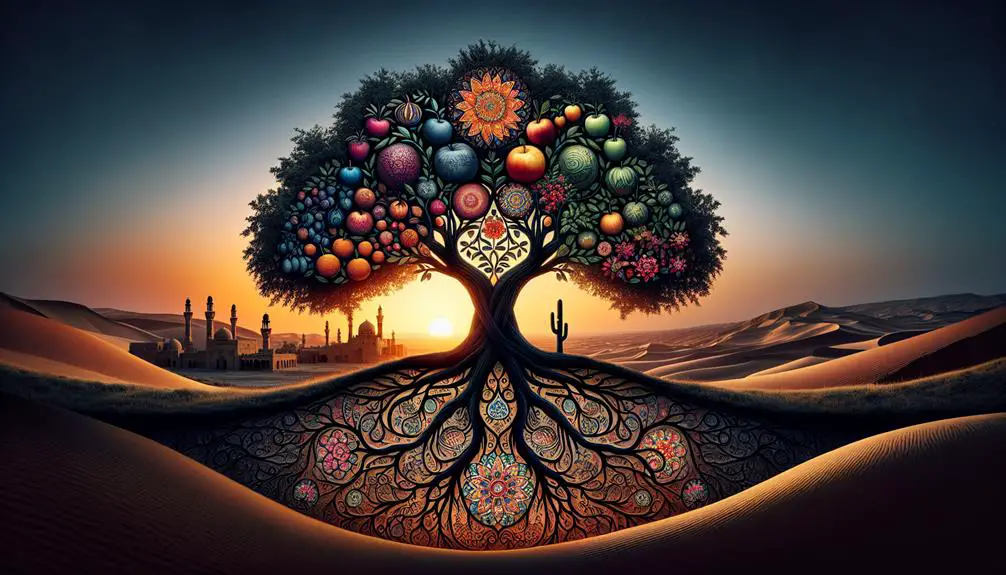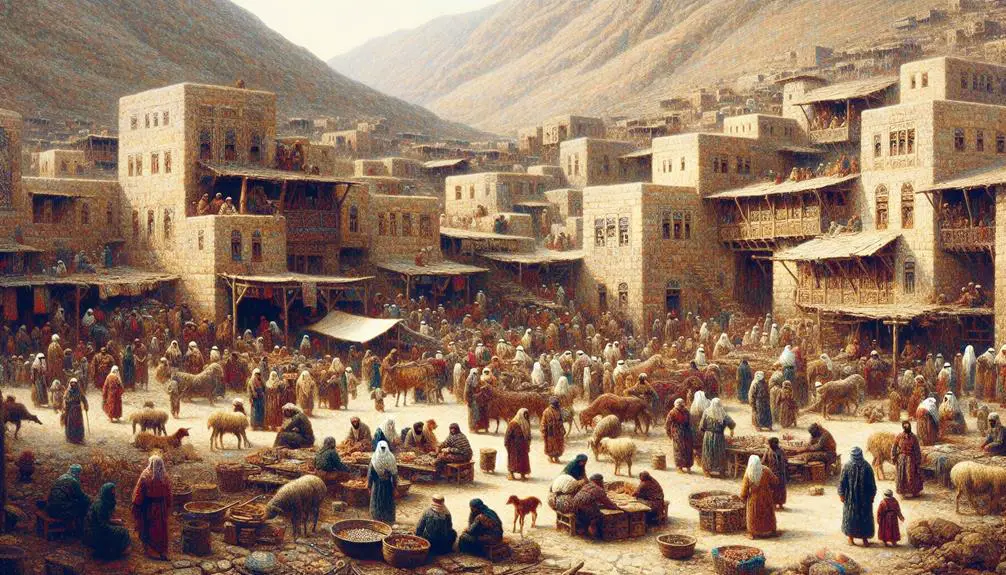Meet Adah, an enigmatic biblical figure, whose story intertwines with ancient mysteries and familial legacies, beckoning a deeper exploration.

Who Was Adah in the Bible
Have you ever wondered about the lesser-known figures in the Bible, such as Adah? You're not alone in your curiosity.
As one of the wives of Lamech and a figure in the lineage of Cain, Adah's story offers a fascinating glimpse into the complex familial and societal dynamics of her time.
Her role and the legacy she leaves behind in biblical history might seem obscure at first glance, but a closer look reveals layers of meaning and cultural significance.
Unpacking her story promises to shed light on the broader narratives at play in ancient times, inviting you to explore the depths of historical and theological insights.
Key Takeaways
- Adah, a descendant of Cain, represents themes of redemption and survival in Genesis.
- Her significance in biblical narratives is tied to her progeny, notably Jabal and Jubal.
- Through Adah's story, insights into ancient patriarchal societies and gender roles are revealed.
- Interpretations of Adah's legacy reflect evolving societal norms and offer lessons on human nature and resilience.
Identifying Adah in Genesis

Who was Adah in the context of Genesis, and what role does she play in the narrative of this foundational biblical book? To answer this, you're delving into a story woven with historical and metaphorical threads, where each name and lineage carries its weight in the larger tapestry. Adah emerges as a figure of interest through her lineage and the significance of her name, which are crucial to understanding her role and representation.
Adah's lineage positions her within the early genealogical framework of Genesis, marking her as a descendant of Cain, who's known within the biblical narrative for the murder of his brother Abel. This connection embeds her within a family lineage that's both marked by divine judgment and a complex narrative of human frailty and survival. Her position in this lineage isn't merely a genealogical note; it underscores themes of redemption and the continuation of life in the face of divine displeasure.
The naming significance of Adah further enriches her narrative role. In Hebrew, her name is thought to mean 'adornment' or 'beauty,' suggesting that her presence in the text might symbolize more than her genealogical position. This interpretation opens a pathway to understanding Adah as a figure embodying themes of grace and beauty amidst the broader narrative of human fallibility and divine judgment.
Adah's Familial Connections

Delving deeper into Adah's narrative, it's crucial to examine her familial connections, which profoundly shape her role and the themes she embodies within the Genesis narrative. Adah's story, though briefly mentioned, offers a rich tapestry of genealogical significance and relationship dynamics, pivotal to understanding the broader context of her existence.
- Genealogical significance: Adah stands as a pivotal figure in the lineage of Lamech, her husband, who's notably a descendant of Cain. This connection not only anchors her in the midst of a complex genealogical web but also imbues her role with a sense of historical weight. Her position as Lamech's wife and the mother of his children, including Jabal and Jubal, who are credited with founding nomadic herding and music, respectively, underscores her contribution to the development of early societal structures within the biblical narrative.
- Relationship dynamics: The nature of Adah's relationship with Lamech, and by extension, her co-wife Zillah, introduces a layer of interpersonal complexity. The dynamics between these characters offer a glimpse into the intricacies of family life and social arrangements in ancient times. Additionally, her role as a mother to key figures in Genesis highlights the maternal influence in the shaping of cultural and occupational legacies.
- Thematic resonance: Through Adah's familial ties, themes such as lineage, legacy, and the societal roles of women are explored. These connections not only contribute to the genealogical mapping of early biblical figures but also reflect on the shifting paradigms of family, work, and creativity in ancient narratives.
Analyzing Adah's familial connections reveals her significance beyond mere names in a genealogy, highlighting the depth and complexity of her character's role in the Genesis narrative.
The Societal Context of Adah's Life

To grasp the full dimensions of Adah's narrative, it's crucial to explore the societal context that shaped her life and actions within the Genesis framework. In the ancient Near East, societies were predominantly patriarchal, structuring both the public and private spheres in ways that predominantly favored men's roles and decisions. Adah's existence within this milieu was inherently influenced by ancient customs and gender roles, which dictated the parameters of her daily life, social interactions, and familial responsibilities.
You'll find that women's lives, including Adah's, were often circumscribed by their relationships to men as daughters, wives, and mothers. Ancient customs mandated their participation in domestic and familial duties, limiting their autonomy and public engagement. Adah's narrative, embedded in these societal norms, reveals the constraints and expectations placed upon women. Her identity and significance were largely defined through her marital connections and her role in progeny, a common theme for women of her time.
Furthermore, the societal context of Adah's life highlights the significance of lineage and heritage in ancient cultures. Gender roles, while restrictive, also afforded women a critical role in the continuation of lineage, a theme that's central to understanding Adah's place within Genesis. This emphasis on progeny and heritage underscores the importance of women, despite their limited societal roles, in fulfilling the divine and cultural mandates of their time.
Understanding these aspects of ancient customs and gender roles enriches our comprehension of Adah's narrative, offering a deeper insight into her life and the societal constructs that shaped it.
Adah's Legacy and Interpretations

Adah's legacy within biblical scholarship and religious discourse offers a nuanced window into the evolving interpretations of her role and significance in Genesis. As you delve into the historical and symbolic significance of her story, it becomes apparent that Adah is more than just a name in an ancient genealogy; she embodies themes and questions that are as relevant today as they were thousands of years ago.
- Symbolic Significance: Adah's presence in the Bible, though brief, has been interpreted symbolically to represent various facets of human experience and moral dilemmas. Scholars have debated her role as a symbol of either the advancement and contribution of women in early human society or, conversely, the marginalization and objectification they faced. This dichotomy invites a deeper reflection on her story's implications for understanding gender dynamics within biblical texts.
- Modern Parallels: The examination of Adah's life and the lives of her descendants reveals intriguing parallels with modern societal issues. Her legacy prompts discussions about the impact of familial lineage on individual destiny and the ongoing struggle between cultural progress and traditional values. These parallels offer a lens through which to view our contemporary challenges in light of historical narratives.
- Evolving Interpretations: Over time, interpretations of Adah's story have evolved, influenced by changing cultural norms, scholarly insights, and theological debates. This evolution reflects the dynamic nature of biblical exegesis, where ancient texts are continually re-evaluated to uncover new meanings and lessons relevant to each generation.
Adah's story, rich in symbolic significance and ripe with modern parallels, serves as a testament to the enduring relevance of biblical narratives in offering insights into human nature and societal dynamics.
Reflections on Adah's Story

Reflecting on Adah's narrative, it becomes clear that her story offers profound insights into the complexities of human nature and societal constructs. Adah's resilience in the face of societal and personal challenges is a testament to the strength inherent within individuals, particularly women, in navigating patriarchal societies. Her journey illuminates the various moral dilemmas that one might encounter when adhering to personal convictions amidst societal expectations and norms.
Adah's story, while ancient, echoes the contemporary struggles faced by many. The moral dilemmas she encounters, from navigating personal identity to the expectations placed upon her by her community, mirror the conflicts many individuals confront in striving to balance personal integrity with societal acceptance. Her resilience, then, isn't just a historical anecdote but a beacon of inspiration for those wrestling with similar issues today. It underscores the potential for personal growth and the importance of steadfastness in one's beliefs and values, despite external pressures.
Moreover, Adah's narrative invites a scholarly analysis of the dynamics between individual agency and societal structures. It challenges readers to consider the ways in which societal constructs can either hinder or harness personal development. Through a detailed examination of Adah's life, one can glean insights into the mechanisms of resilience and the ethical complexities inherent in personal decision-making processes.
Frequently Asked Questions
How Does the Name "Adah" Reflect Her Character or Role Within the Biblical Narrative, Beyond Its Literal Meaning?
You'll find that Adah's name, beyond its literal meaning, carries deep naming significance and character symbolism within the biblical narrative. It reflects her unique role and traits, showcasing how names in these stories aren't just labels but insights into the characters' essences and destinies.
Analyzing Adah's name helps you understand her more profoundly, revealing layers of meaning that underscore her contributions and the thematic richness of the texts she inhabits.
Are There Any Archaeological Findings or Historical Records Outside the Bible That Mention or Could Be Linked to Adah?
Interestingly, while you're exploring the depths of ancient history, it's hard to find direct archaeological evidence or historical records specifically mentioning Adah. Given the challenges of excavation and the vast timelines involved, tracing Adah's lineage outside biblical texts becomes a complex puzzle.
Despite these obstacles, scholars meticulously analyze artifacts and records, hoping to uncover clues. Yet, the absence of concrete evidence doesn't diminish the intrigue surrounding her story.
How Has Adah's Story Influenced Modern Cultural Works, Such as Literature, Art, or Music?
Adah's story has subtly permeated modern cultural expressions, influencing literature, art, and music. You'll find her legacy woven into narratives that explore themes of identity and transformation, inspiring Adah themed events that celebrate her enduring influence.
In the realm of fashion, designers have drawn on her story, creating Adah inspired collections that blend historical motifs with contemporary aesthetics. This fusion highlights her timeless appeal and the multifaceted ways she continues to inspire modern creativity.
What Are the Major Theological Debates or Interpretations Surrounding Adah's Story That Diverge From Traditional Views?
Ever pondered how a single story can spark endless debate? You're witnessing this with the discussions around Adah's agency and interpretation variability.
Scholars dig deep, contrasting traditional views with fresh interpretations that emphasize Adah's decision-making power, challenging long-held assumptions. This scholarly debate doesn't just add layers to her story; it reshapes our understanding of biblical narratives, demonstrating the rich tapestry of thought that ancient texts, like Adah's story, inspire.
How Do Different Religious Traditions Besides Christianity (E.G., Judaism, Islam) View or Interpret the Character of Adah?
You're exploring how different faiths outside Christianity, like Judaism and Islam, perceive Adah. This inquiry delves into Adah's lineage and the interpretative variations that exist.
Each tradition brings its own analytical lens, offering detailed insights that might diverge significantly. These perspectives enrich your understanding of Adah, illustrating how her story is woven differently across religious texts.
Such scholarly exploration reveals the nuanced interpretations that shape Adah's legacy in diverse religious contexts.
Conclusion
In sum, Adah's narrative in Genesis isn't just a brief mention; it's a mosaic piece in the grand design of biblical history. Like a single thread in a tapestry, her story might seem insignificant at first glance.
Yet, when viewed within the broader context of her time, Adah's life offers invaluable insights into the societal and familial structures of ancient times. Her legacy, woven into the fabric of biblical scholarship, challenges us to look beyond the surface, revealing the depth and complexity of women's roles in biblical narratives.



Sign up